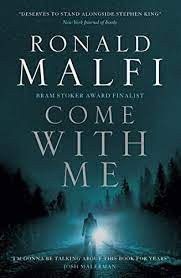
Synopsis:
Aaron Decker’s life changes one December morning when his wife Allison is killed. Haunted by her absence—and her ghost—Aaron goes through her belongings, where he finds a receipt for a motel room in another part of the country. Piloted by grief and an increasing sense of curiosity, Aaron embarks on a journey to discover what Allison had been doing in the weeks prior to her death.
Yet Aaron is unprepared to discover the dark secrets Allison kept, the death and horror that make up the tapestry of her hidden life. And with each dark secret revealed, Aaron becomes more and more consumed by his obsession to learn the terrifying truth about the woman who had been his wife, even if it puts his own life at risk.
Review:
Come With Me is a book in which preconceptions are challenged, reality is questioned, and secrets are unravelled. In this love story for the lost, tensions are high, and the suspense is palpable- it is clear Ronald is one of the finest in the craft. Whilst waiting for the British Postal Service (scoff) to deliver my ARC of “Small Town Horror,” I figured I’d start wading through Malfi’s back catalogue… I can say with conviction that this is the best time killer I’ve come across yet. In this deeply-felt exploration of betrayal and grief, we’re dragged along on a murky trek across the east atlantic… come with me?
Shortly after her tragic death, Aaron realises that the secrets his wife, Alison Decker was harbouring from him, certainly go beyond the norm. First it’s the wiped search history on her laptop, then it’s the Xanax he had no idea she was taking, and then the revolver she had squirrelled away in their closet. Alison was by no means an open book, and now that she is no longer here to explain herself, Aaron- clouded by grief and betrayal- is determined to unearth her secrets.
I believe the biggest and most interesting theme hidden within the pages of “Come With Me,” is identity, and this can be divided into three sub-categories.
- Our identity within relationships. The opening sentence is “Every marriage has its secrets.” Now, the very foundation of marriage is faith and trust within one another, and the idea that someone we have devoted ourselves to wholly, could hide things from us is scary within itself. As opposed to the average skeleton, Alison has a whole cemetery (and a revolver) in the closet. When Aaron discovers that Alison has been investigating a series of seemingly unconnected murders, we gradually watch him pick up where she left off. Aaron is a normal guy, who spends his time translating Japanese fiction into English- he is no Sherlock Holmes…Some would speculate he loses his own identity, instead taking on that of Alisons.
- Our “pseudo-identity.” Shortly after the death of Alison, as a coping mechanism, Aaron often curls up behind the facade of his “other self.” Whilst normal Aaron is a grief-stricken shell of the man he was previous to Alison’s death, other Aaron continues working, and seems to just glide through life as if nothing has changed at all. Throwing yourself into work and trying to move on with life is an understandable and common coping mechanism, although Malfi takes this into unexpected meta-physical territory as we near the end- GREAT stuff.
- Our own identity. Amidst the chaos of Aaron’s grief and the gradually unravelling mysteries, his sense of self is somewhat lost. We only really see him through a fun house mirror of tragedy and heart-break. This leaves room for commentary on obsession, and of course grief.
Perhaps my only complaint is the mystery’s resolution. I obviously won’t be divulging who exactly the culprit was, but I feel like all the amazing commentary on grief and identity came at the expense of proper foreshadowing- making it feel somewhat lazy. That being said, the metaphysical twist at the end more than redeemed this for me… and, being a character-driven novel it’s understandable that there would be more of a focus on Aaron and his relationship with Alison.
Everything about this novel is meticulously thought out, even the very fine details. Malfi writes from a quasi second-person perspective, addressing Alison throughout. In its simplest form, Come With Me, follows a man communicating with his dead wife. Much like “This Thing Between Us,” by Gus Moreno, it’s a deeply intimate affair. The emotions are raw and overwhelming anyway, this just about pushes it into heart-breaking territory.
In conclusion, Malfi invites readers on a gripping ride, riddled with twists, turns, and heart-stopping revelations. We navigate a tangled labyrinth of grief, betrayal and redemption. As the miles stack up, so does a palpable sense of dread and unease. Come With Me is a viscerally earth-shattering read, which seamlessly blends the paranormal with the deeply personal. Who knows what secrets you might uncover in the shadows? In the haunting corridors of “Come With Me,” the only certainty is uncertainty.









Leave a Reply